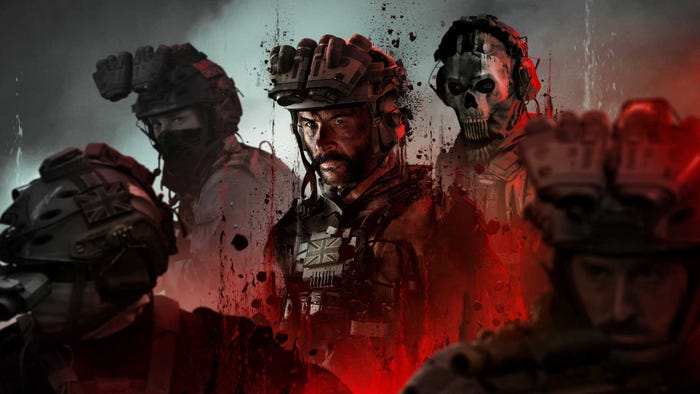
Featured Blog | This community-written post highlights the best of what the game industry has to offer. Read more like it on the Game Developer Blogs.
A look at Left 4 Dead and how scoring methods affect player satisfaction.

I mentioned in my first post that perhaps designers should develop new metrics of achievement and performance. In this post I would like to investigate Left 4 Dead as a case study, and propose how its scoring system could be improved to facilitate greater player satisfaction and team play.
One note before proceeding, however: this post, for now, assumes that good team play provides the greatest intrinsic satisfaction value possible within a game like Left 4 Dead (a very balanced game which makes soloing quite difficult). The very nature of gameplay found in Left 4 Dead already promotes good team work; it is, in fact, quite essential to success, particularly in Expert Campaign mode, or Versus mode. Room for improvement, then, lies in how the game scores the team’s, and individual players’, performance.
First, let's examine some anti-team play behaviors in Campaign mode. Admittedly, Campaign mode does a far better job than Versus in terms of its metrics. Problems, however, still tend to rise from the kill count rating. Because the kill count score is so important to many players (the why of this will be discussed further below), there is often competition within the same team for pipe bomb throws or gas can explosions (leading to mistimed or too early executions).
In other cases, individual players will attempt to “rambo" (or solo) an incoming horde or special infected, often to the detriment of the team. This is not to mention survivors who will leave team mates to die in the finale chapter than risk dying in order to score an Expert achievement or keep up their finale survival percentage.
Consider, then, if the kill count rating was removed entirely from the end score listing, along with the finale survival rate on the player’s stat page (a statistic which, by the way, is not very meaningful to begin with). Now, what if these were replaced with the percentage of teammates that complete each chapter? Additionally, a Versus-like player score could be implemented for individual players which depends on kills assisted and teammates protected, or damage inflicted (minus grenades and gas cans) as opposed to pure kill counts. It’s easy to imagine how just these changes in the scoring system could potentially alter gameplay behavior quite dramatically.
While the above may sound like a disproportionate condemnation of kill counts, this is only reflecting the disproportionate role kill counts play in the minds of many players. Unfortunately, they are so engraved into the scoring systems of FPS’s that some players may consider their ability to individuate themselves to be curtailed. But perhaps that is exactly the point here; in order to foster greater overall player satisfaction, it may be that soloist (or, less kindly, selfish) behaviors should not be rewarded as much as they are in the current state of FPS games today (I’m looking at you, Counter-Strike!).
Ironically, Versus mode would actually benefit from more individualized scoring. One thing to keep in mind is that, as the statistics are represented now, the Versus stat that matters most is the win/loss ratio. Since the average damage inflicted to Survivors per game is not kept across games (as Infected), and no such scoring system for individual Survivor players exists at all, the only score that ends up reflecting player performance is the win/loss ratio. This is quite problematic, however, because of the heavy reliance on all team members being effective in Versus.
Due to the all-or-nothing nature of scoring on the Survivors’ side (i.e., the Survivor multiplier), one weak player can be a serious detriment to the team’s score. The problems of such a system become even more pronounced in a two chapter map such as Crash Course. In certain cases, losing a Survivor can cost the team that round, while a lagging Survivor or accidental car alarm trigger can cause a team wipe under many circumstances. As for the Infected side, three or four failed Booms, or a failed tank, can make the difference between a winning round and an utterly futile one.
To add to the frustration, a good Survivor team that knows how to push with four auto-shotguns can completely dominate their round. Since the Survivors don’t earn any points for anything other than simply arriving in the Safehouse with the highest health possible, there is no reason whatsoever not to make a dash to the finish line. These conditions result in a high turn over rate of frequent rage quitting, and too often an entire team can be replaced two or three times during the course of just one game.
Let us contemplate an alternate scoring system. The scoring set up for individual Infected players is already quite good, but the Survivor scoring could use some improvement. Suppose that the Survivors are incentivized to take their time by adding the number of Special Infected and Common Infected killed as a factor in the final round score. Now, in order to prevent farming abuse, the Survivors are then penalized for, say, every 20 seconds taken past 16 minutes per round, for instance (or, as a game mechanic change, as opposed to scoring change, the spawn time for Special Infected steadily decreases the longer the Survivors stay in one location, much as the insta-spawn for Survivors staying in the Safehouse).
These points, then, would be added outside of the Survivor multiplier at the end, and should be a considerable sum, to the point where the final score for one Survivor just barely making it to the Safehouse after the Survivor team killing, for instance, 21 special infected and 380 common would be comparable to all four Survivors arriving safely with full health, but only 6 specials and 67 common killed (note, under such a system, the Survivors could score significantly even if none of them make it to the Safehouse). These kill counts, then, should be stored in the player’s statistics across games as an average of the amount of damage inflicted (not kills made)—similar to method in which the Infected scoring is done.
Add to this a change in which the average Infected player score is also stored (categorized into the different Specials) in addition to the maximum damage inflicted, and you have the makings of a system in which a player can be satisfied with their gameplay despite being on a losing team.
Why should these changes make a difference, or why does the win/loss ratio or kill count even matter? The answer deals with identity, and the amount of investment a player has made in his statistics as a reflection of his identity. Here, a rather outdated and cliché phrase comes to mind: “Got game?” That is, does a player have skill? In this sense, often the only things that represent a player within a game space are his skills—they are the sum of his identity, as unrealistic (and occasionally, unhealthy to the psyche) as such a superficial representation may be.
This is especially true in random pick up groups, where a team mate's efficacy is frequently the overriding (or only) concern. What becomes important, then, in establishing one's identity is what is deemed important enough by the game to be scored and kept track of (which is why the achievements in Mass Effect are so brilliant; not only does the game acknowledge extra effort, but it then proceeds to actually reward the player with ludic enhancements as well).
I mentioned in my first post that a game can become too real. By this I meant that a player will sometimes become too invested in his persona (or the identity he wishes to display) and lose his capacity to distance himself as an individual composed of more than just the skills he brings to a game. But even without such a phenomenon, it is crucial for the sake of player satisfaction that the statistics which represent the player’s skills are as close to truthfully reflecting that player’s skills as possible—because these statistics are standing in for the player’s identity.
These points lead us to the assumption made earlier that fulfilling a role within a coordinated team is perhaps the greatest intrinsically satisfying experience possible in a game such as Left 4 Dead. The reasoning is that the primary mechanism for satisfaction here is role fulfillment and identity affirmation—that a player is able to envision an identity for himself and be able to confirm that identity as real, to himself and, more importantly (in this case), to his peers.
In my next post, I will continue this line of thought to discuss why identity plays such an outsize role by drawing some striking parallels between gameplay and the Socratic method.
In the meantime, this article for consideration:
The No-Stats All-Star
Read more about:
Featured BlogsAbout the Author(s)
You May Also Like









